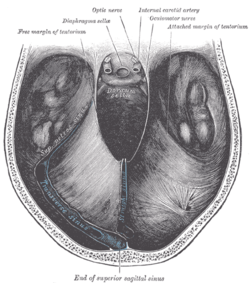The diaphragma sellae or sellar diaphragm is a small, circular sheet of dura mater forming an (incomplete) roof over the sella turcica and covering the pituitary gland lodged therein. The diaphragma sellae forms a central opening to accommodate the passage of the pituitary stalk (infundibulum)[1] which interconnects the pituitary gland and the hypothalamus.
| Diaphragma sellae | |
|---|---|
 Tentorium cerebelli seen from above. (Diaphragma sellae labeled at upper left.) | |
| Details | |
| Identifiers | |
| Latin | diaphragma sellae |
| TA98 | A14.1.01.107 |
| TA2 | 5378 |
| FMA | 78540 |
| Anatomical terminology | |
The diaphragma sellae is an important neurosurgical landmark.[1]
Anatomy
editBoundaries
editThe diaphragma sellae has a posterior boundary at the dorsum sellae and an anterior boundary at the tuberculum sellae along with the two small eminences (one on either side) called the middle clinoid processes.
Variation
editThe opening formed by the diaphragma sellae varies greatly in size between individuals.[1]
Clinical significance
editPituitary tumours may grow to extend superiorly beyond the diaphragma sellae.[1] Violation of the diaphragma sellae during an endoscopic endonasal transsphenoidal pituitary tumor resection will result in a cerebrospinal fluid leak.[citation needed]
Additional images
edit-
Dura mater and its processes exposed by removing part of the right half of the skull, and the brain.
-
Human brain dura mater (reflections)
References
edit- ^ a b c d Standring, Susan (2020). Gray's Anatomy: The Anatomical Basis of Clinical Practice (42nd ed.). New York. p. 398. ISBN 978-0-7020-7707-4. OCLC 1201341621.
{{cite book}}: CS1 maint: location missing publisher (link)
This article incorporates text in the public domain from page 814 of the 20th edition of Gray's Anatomy (1918)
External links
edit- Anatomy photo:28:14-0101 at the SUNY Downstate Medical Center - "Cranial Fossae: Diaphragma Sellae"
- Imaging at wfns.org